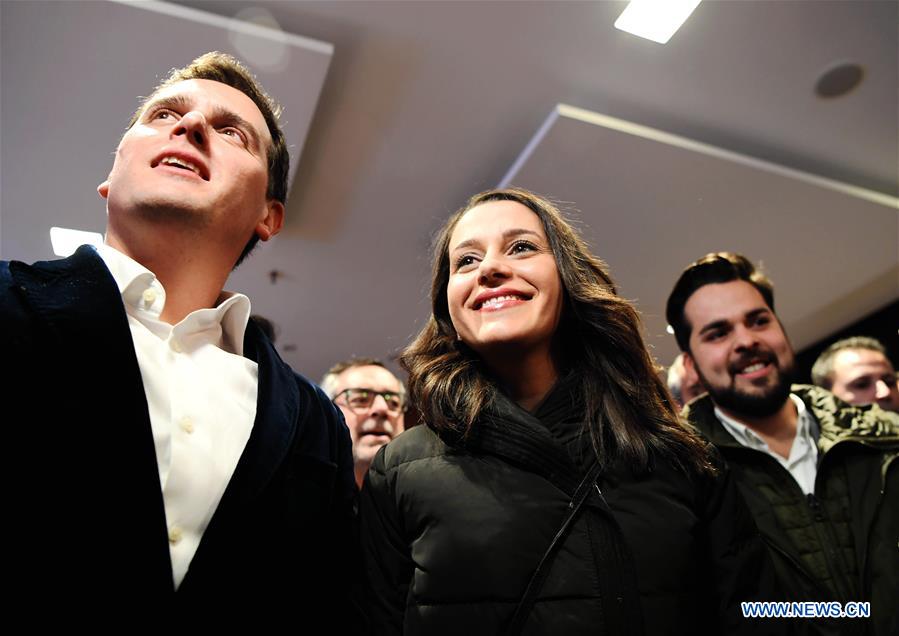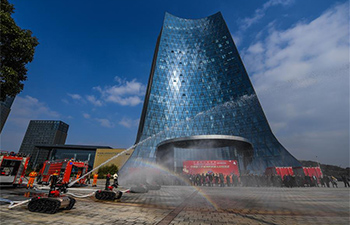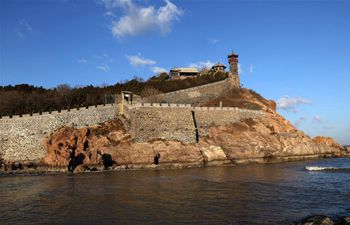
Candidate of Ciudadanos Party Ines Arrimadas (R F) and President of Ciudadanos party Albert Rivera (L) meet the media after the result of elections came out in Barcelona, Spain, Dec. 21, 2017. The pro-unity Catalan party Ciudadanos (Cs) won the most votes with 25 percent in the snap regional election on Thursday, with 99.5 percent of votes counted. (Xinhua/Guo Qiuda)
BARCELONA, Spain, Dec. 22 (Xinhua) -- The pro-unity Catalan party Ciudadanos (Cs) won the most votes with 25 percent in the snap regional election on Thursday, with 99.5 percent of votes counted.
But the pro-independence bloc consisting of three parties -- JuntsxCat, ERC and CUP -- kept its absolute majority in the 135-seat regional parliament, crossing the threshold of 68 required for a majority.
PRO-UNITY CIUDADANOS BECOMES NO.1 POLITICAL FORCE
Ciudadanos, led by Ines Arrimadas, gained 37 seats with 25.36 percent of the votes.
Arrimadas delivered a speech at Espanya Square after her party became the first political force in Catalonia's regional election.
"For the first time a constitutional force wins the elections in Catalonia, and it is Ciudadanos," she said, adding that one in four Catalans trusted the political party.
Arrimadas said the results sent a message to the world that the majority of Catalan people were in favor of remaining in Spain and separatists can not talk on behalf of all Catalans.
In the pro-unity bloc, the Catalan Socialist Party (PSC) won 17 seats, having slightly outweighed their performance in 2015, but the center-right People's Party (PP), under the leadership of Spanish Prime Minister Mariano Rajoy, suffered a serious setback and got only three seats.
In the pro-secession bloc, former Catalan leader Carles Puigdemont's JuntsxCat, or Junts per Catalunya (Together for Catalonia), secured 34 seats with 21.68 percent of the votes.
Left-wing pro-secession ERC came third with 32 seats and the anti-capitalist CUP won four seats.
The three pro-independence forces together make up 70 seats, two above a majority but two less than in the previous 2015 election.
A record 82 percent of Catalonia's 5.5 million eligible voters cast their ballots, well above the 74.9-percent turnout in the last election held in September 2015.
The snap election was called by Rajoy, after he sacked the Catalan regional government and dissolved the regional parliament in late October, following an independence declaration by separatist regional politicians.
PROBLEMS RAISED BY RESULTS
The results create several problems given the disastrous setback for the PP and the slightly disappointing performance of the PSC, as it is impossible for the three pro-unity parties to get anywhere near a majority.
Meanwhile, although JuntsxCat performed much better than expected in holding off the ERC as the main separatist force, their leader Puigdemont is currently in exile in Belgium with an arrest warrant hanging over him if he returns to Spain, while the ERC leader Oriol Junqueras is in pre-trial detention facing charges of rebellion, sedition and misuse of public funds.
There are also questions over the relationship of the two main pro-secession parties. The CUP had affirmed its commitment to a unilateral declaration of independence for the region before the election, while the ERC and JuntsxCat now appear to favor a less drastic approach to gaining independence for the region.
Despite Ciudadanos claiming the most votes and seats, it has to be viewed as a pyrrhic victory for Arrimadas, who has succeeded in virtually wiping out the PP as a political force in Catalonia.
Indeed the PP will have to sit with the CUP in the "mixed group" in the next assembly as it does not have enough members to form its own parliamentary group, but looks certain to be the leader of the opposition.
Meanwhile, the PSC is likely to be disappointed that despite a more moderate tone than either Ciudadanos or the PP, they gained just one more seat in the election, which more than anything highlights how divided Catalan society remains.
The region was governed by a coalition consisting of the Socialists, ERC and a mix of the United Left and Greens 10 years ago. Given the divisive events of recent months, a repeat of that kind of coalition would certainly help heal the wounds in Catalonia.
"I see a Catalonia where reconciliation and brotherhood should be the main idea. We need to rebuild reconciliation," a 47-year-old civil servant who only gave his name as Dani told Xinhua at a polling station in Barcelona.
"The only solution for the future of Catalonia is a deal among all sides to relaunch the nation. Tomorrow we have to talk more than ever, because so far we have talked only a bit. More dialogue, more negotiation and more deals (are needed)," he said.















